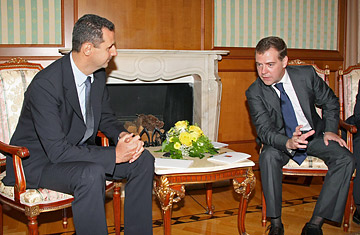
Russian President Dmitri Medvedev meets with Syrian President Bashar al-Assad.
With Russian soldiers occupying swaths of the Republic of Georgia, one might have thought that Russian President Dmitri Medvedev would have more pressing matters than scooting off to the Black Sea summer resort town of Sochi. But last week Medvedev did just that for a pleasant — and possibly ominous — bit of business: entertaining Syria's President Bashar al Assad, one of the few world leaders who have flown to Russia's side during the Georgian crisis. The trip paid off for Assad when Russia agreed to strengthen military ties with Syria. According to the Russian press, Assad also offered to host advanced Russian missile systems on Syrian soil.
The Syrian state media later denied that Damascus was offering to set up Russian rocket bases. But even rumors of such a deal look suspiciously like a Russian response to U.S. plans to set up a missile defense system in Poland, an agreement signed earlier this month at the height of the Georgian conflict and denounced by Russia. Moreover, the rejuvenated Russian-Syrian connection is just one example of how the so-called new Cold War between the U.S. and Russian is spreading to the Middle East, mapping itself onto the region's pre-existing conflicts, and complicating efforts to bring stability to a region that is on the verge of a new hot war.
Since the Iraq war began in 2003, the Middle East has been split by its own not-so-cold war for regional domination between Iran and its allies (Syria, Hizballah and Hamas) and the U.S. and its allies (Israel, Saudi Arabia and Egypt). Though Russia has been a mostly peripheral player, it has often wound up on the opposite side of Washington. In 2005, Moscow agreed to help Iran develop a civilian nuclear reactor, infuriating the Bush administration, which claims that Iran's nuclear energy program is merely a cover for developing weapons. Russian also supplied Syria with weapons that wound up in the hands of Hizballah, the Lebanese anti-Israeli militant group. Israeli military sources say that these Russian weapons — especially advanced anti-tank rockets — were vital in enabling Hizballah to face down the Israeli army during its disastrous incursion into Lebanon in the summer of 2006.
These tensions are now likely to grow as Russia flexes its muscles in a region where the U.S. is vulnerable. For one thing, Russia sees fewer and fewer reasons to tread lightly around Israel. During the 2006 Lebanon war, Russia condemned Hizballah actions as terrorism, and afterwards claimed it had made efforts to prevent weapons sales to Syria from helping Hizballah. But the war in Georgia highlighted that Israel is itself in a kind of arms race with Russia. Israel was supplying the Georgian army with weapons and Israeli security companies were training Georgian soldiers. And recent Israeli press reports claim that Hizballah has set up Russian-made radar-guided air defense systems since the 2006 war in the eastern Bekaa Valley in order to shoot down Israeli jets.
What's more, ever since the U.S. circulated a draft Security Council Resolution condemning Russia's Georgian invasion, Washington can expect scant Russian help at the United Nations to prevent Iran from developing nuclear technology. This could have dramatic consequences. Israeli officials have been implying that if the U.S. and the U.N. fail to halt the Iranian nuclear program, they will take matters into their own hands and launch air strikes against Iran.
Of course, the new Cold War in the Middle East may end up amounting to no more than a passing chill. Assad's flirtation with Russia could be intended to strengthen Syria's hand in ongoing indirect peace talks with Israel through Turkish mediation. On the other hand, Syrian hardliners opposed to peace could see Russia's backing as one more strong argument for holding out against American and international pressure to recognize Israel.
A disturbing sense of déjà vu adheres to all these alliances, arms races and nuclear programs. The Middle East was a major theater in the original Cold War. Before the Camp David Accords of 1978, Syria, Iraq and Egypt were all Soviet client states; indeed, Syria still has the aging Soviet-era fighter jets and tanks to prove it. And while all stayed quiet on the European front of the Cold War, it got pretty hot in the Middle East. In at least three major wars between Arabs and Israelis (in 1967, 1973 and 1982), the U.S. and the Soviet Union got to see how their weapons stacked up against those of their foe. As the chill spreads today, it's worth remembering that the Middle East is a region where conflicts too often don't stay on ice.
